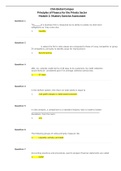FIN 300 (Principles of Finance for the Private Sector)
Colorado State University - Global Campus
All 21 results
Sort by
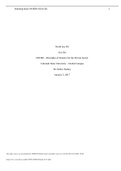
-
FIN Module 8 CT FIN300 – Principles of Finance for the Private Sector Latest 2022-2023
- Summary • 5 pages • 2022
-
- $6.99
- + learn more
NORTH SEA OIL Executive Summary The data compiled by North Sea Oil contains information relative to the current costs of its sources of external capital which includes long term debt of 7%, preferred stock of 19%, and common stock equity of 20%. The company’s target capital structure based on the weighted average cost of capital involves 25% of long term debt, 25% of preferred stock, and 50% of common stock and retained earnings. There are two projects that are under evaluation for poss...
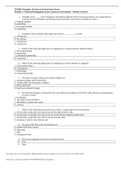
-
FIN300 - Mastery Exam Questions & Answers/Rationales > 2022/2023.
- Exam (elaborations) • 8 pages • 2022
-
- $7.99
- + learn more
FIN300: Principles of Finance for the Private Sector Module 1: Financial Management in the Corporate Environment - Mastery Exercise 1. Strengths of the _____ form of business ownership include the owner receiving all profits, low organizational costs and ease of dissolution, and having income included on the owner's personal tax return. a. holding company b. partnership c. sole proprietorship d. corporation 2. In general, most corporate capital gains are taxed at ___________ tax rate. ...
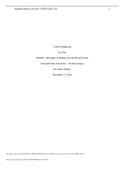
-
Module 6 CT Questions & Answers_ Spring 2022-2023
- Other • 2 pages • 2022
-
- $6.49
- + learn more
After analyzing the project opportunities for Galaxy Satellite Co. I found that each one provides cash flows greater to the initial investment increasing the market value of the firm. Project B and Project D both utilize a higher amount of the capital budget and provide greater NPV amounts on their own, however, by combining Projects C and D the investments maximize the capital budget and provide the greatest NPV of $410,000. When taking into consideration the IRR, Projects B and C allow th...
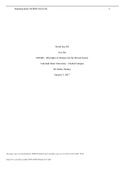
-
FIN Module 8 CT FIN 300 Questions {Answered Correctly! 2022-2023}
- Summary • 5 pages • 2022
-
- $6.49
- + learn more
NORTH SEA OIL Executive Summary The data compiled by North Sea Oil contains information relative to the current costs of its sources of external capital which includes long term debt of 7%, preferred stock of 19%, and common stock equity of 20%. The company’s target capital structure based on the weighted average cost of capital involves 25% of long term debt, 25% of preferred stock, and 50% of common stock and retained earnings. There are two projects that are under evaluation for poss...
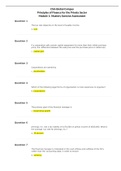
-
FIN300 - Principles of Finance for the Private Sector: Module 1 Mastery Exercise Assessment Questions and Answers Latest Graded A.
- Exam (elaborations) • 4 pages • 2021
-
- $8.25
- + learn more
Question 1 The tax rate depends on the level of taxable income. a. true Question 2 If a corporation sells certain capital equipment for more than their initial purchase price, the difference between the sale price and the purchase price is called a(n) c. capital gain Question 3 Corporations are owned by c. stockholders
FIN 300: Principles of Finance for the Private Sector - Mastery Exercise Assessment Modules 2-8 (COMBINED PACKAGE)
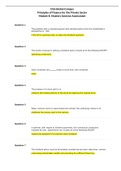
-
FIN 300: Principles of Finance for the Private Sector - Module 8: Mastery Exercise Assessment (WITH 100% VERIFIED ANSWERS)
- Exam (elaborations) • 5 pages • 2021
- Available in package deal
-
- $11.49
- + learn more
Question 1 The problem with a constant-payout-ratio dividend policy from the shareholder's perspective is that if the firm's earnings drop, so does the dividend payment. Question 2 The factors involved in setting a dividend policy include all of the following EXCEPT Operating constraints.
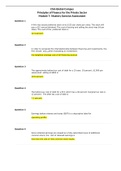
-
FIN 300: Principles of Finance for the Private Sector - Module 7: Mastery Exercise Assessment (WITH 100% VERIFIED ANSWERS)
- Exam (elaborations) • 5 pages • 2021
- Available in package deal
-
- $11.49
- + learn more
Question 1 A firm has issued preferred stock at its $125 per share par value. The stock will pay a $15 annual dividend. The cost of issuing and selling the stock was $4 per share. The cost of the preferred stock is 12.4 percent.
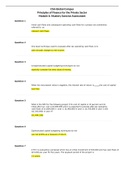
-
FIN 300: Principles of Finance for the Private Sector - Module 6: Mastery Exercise Assessment (WITH 100% VERIFIED ANSWERS)
- Exam (elaborations) • 4 pages • 2021
- Available in package deal
-
- $11.49
- + learn more
Question 1 Initial cash flows and subsequent operating cash flows for a project are sometimes referred to as relevant cash flows. Question 2 One basic technique used to evaluate after-tax operating cash flows is to add noncash charges to net income.
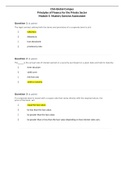
-
FIN 300: Principles of Finance for the Private Sector - Module 5: Mastery Exercise Assessment (WITH 100% VERIFIED ANSWERS)
- Exam (elaborations) • 12 pages • 2021
- Available in package deal
-
- $11.49
- + learn more
Question 1 (1 point) The legal contract setting forth the terms and provisions of a corporate bond is a(n) a indenture. b debenture. c loan document. d promissory note. Question 2 (1 point) The is the annual rate of interest earned on a security purchased on a given date and held to maturity. a term structure b yield curve c risk-free rate d yield to maturity

$6.50 for your textbook summary multiplied by 100 fellow students... Do the math: that's a lot of money! Don't be a thief of your own wallet and start uploading yours now. Discover all about earning on Stuvia



